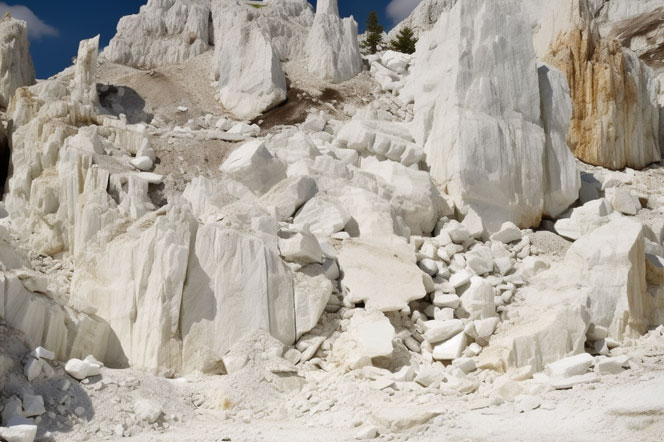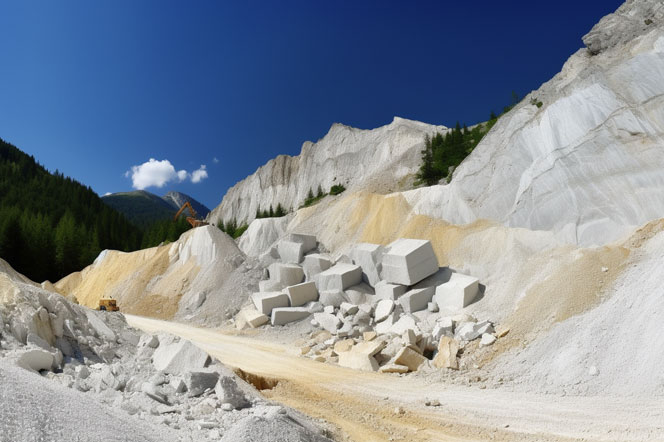INSPIRED TO CREATE A UNIQUE AND AUTHENTIC PROJECT
Menu
Close
INSPIRED TO CREATE A UNIQUE AND AUTHENTIC PROJECT
Discover the Marvels of Dolomite: Unveiling its Properties, Uses, and Benefits for Various Industries and the Environment.

Dolomite, a remarkable mineral, has captivated the attention of scientists, geologists, and enthusiasts alike due to its fascinating properties and versatile applications. In this comprehensive article, we delve into the depths of dolomite, exploring its formation, physical characteristics, uses, and the benefits it offers across various industries. Go on to find out more, happy reading.
Let’s start by demystifying the concept of dolomite. Dolomite is a sedimentary rock primarily composed of calcium magnesium carbonate, scientifically represented by the chemical formula CaMg(CO₃)₂. It is formed through a captivating geological process known as dolomitization, where magnesium-rich fluids gradually replace the calcium in limestone or lime mud. Over millions of years, this transformation gives rise to the formation of dolomite deposits.
Dolomite owes its existence to the intricate interplay between ancient marine environments and the activities of microorganisms. It typically occurs in regions where magnesium-rich water interacts with limestone or lime mud, a process known as diagenesis. Through this chemical reaction, the composition of the rock gradually alters, eventually leading to the birth of dolomite.
One cannot help but be captivated by the unique physical properties exhibited by dolomite. Found in shades of white, gray, or pink, dolomite showcases a mesmerizing pearly to vitreous luster. Upon closer inspection, you will notice its characteristic rhombohedral crystal shape, accompanied by a hardness rating ranging from 3.5 to 4 on the Mohs scale.
But here’s where dolomite truly stands out: when dolomite comes into contact with hydrochloric acid, it produces a weak effervescence or fizz. This distinctive trait helps differentiate dolomite from other minerals and adds to its allure.

Dolomite plays a vital role in the construction industry, owing to its exceptional hardness, durability, and resistance to weathering. It serves as a cornerstone aggregate in the production of high-quality concrete, asphalt, and road base materials. Moreover, dolomite’s impressive thermal stability makes it an invaluable component in the manufacturing of refractory bricks used in kilns and furnaces.
In the realm of agriculture, dolomite finds extensive application as a soil conditioner and pH balancer. Its rich calcium and magnesium content helps neutralize acidic soils, creating an optimal environment for plant growth and nutrient absorption. Dolomite also proves to be a valuable ingredient in fertilizers and animal feed supplements, contributing to the overall health of soil and livestock.
The remarkable properties of dolomite extend to the realm of water treatment. Its alkaline nature enables it to effectively remove impurities and regulate pH levels in water sources. Dolomite is commonly employed in wastewater treatment plants and swimming pools, where it enhances water quality and creates a favorable environment for aquatic life to thrive.
The steel industry relies on dolomite as a flux material during the smelting process. By acting as a fluxing agent, dolomite assists in the removal of impurities such as silica and phosphorus from the steel, ensuring the production of high-quality steel. Incorporating dolomite into the steelmaking process enhances furnace efficiency and improves the final product’s overall quality.

Dolomite’s versatility extends to environmental applications, where it proves to be a valuable asset in preserving and restoring ecological balance. It plays a significant role in the remediation of acidic mine drainage, utilizing its alkaline properties to neutralize the acidity and prevent harm to aquatic ecosystems. Additionally, dolomite is employed in the purification of industrial emissions, reducing the release of harmful pollutants into the air, and promoting a cleaner and healthier environment.
By incorporating dolomite into soil amendments and fertilizers, we can enhance nutrient absorption in plants. Dolomite’s ability to maintain optimal pH levels enables plants to efficiently take up essential nutrients, resulting in healthier growth, increased yields, and improved crop quality. Embracing dolomite means embracing bountiful harvests and nourishing the world around us.
Dolomite’s involvement in water treatment processes leads to cleaner and safer water sources. Its alkaline properties neutralize acidic water, reducing corrosiveness and the risk of pipe deterioration. By improving water quality, dolomite becomes a guardian of human and environmental health, ensuring the availability of pristine water resources for generations to come.
Dolomite’s durability and resistance to weathering make it an excellent choice for sustainable construction practices. Its long-lasting nature reduces the need for frequent replacements, minimizing waste and conserving precious resources. Incorporating dolomite into construction materials not only ensures structural integrity but also supports the development of sustainable infrastructure.
In environmental conservation efforts, dolomite emerges as a powerful ally. By neutralizing acidic mine drainage and purifying industrial emissions, dolomite mitigates the negative impacts of human activities on the environment. It plays a crucial role in preserving fragile ecosystems, protecting biodiversity, and fostering a harmonious coexistence with the natural world.
Dolomite is a true marvel of nature, offering a wealth of benefits across various industries and environmental spheres. From its captivating formation through the intricate processes of dolomitization to its diverse applications in construction, agriculture, water treatment, and environmental preservation, dolomite proves its worth time and time again.
Let us embrace the wonders of dolomite and harness its exceptional properties to build a better and more sustainable future. By incorporating dolomite into our practices and industries, we unlock innovative solutions, nurture thriving ecosystems, and create a world where harmony between human progress and nature flourishes.
Visit our dolomite showroom and get to know our products.
Did you enjoy learning more about dolomite stone? Share this content with your friends and family so they can also learn about the benefits of this stone.
PR Stone Collection is a collection of exclusive materials from the quarries of the block producer PR Group Paraná.